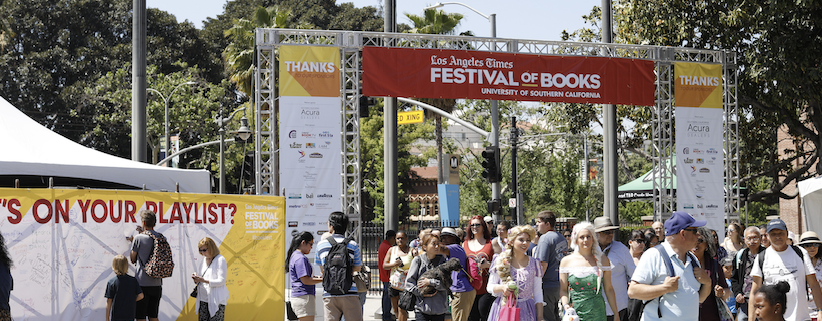LA Times prepares for festival of books

This weekend, USC students and fellow Angelenos will be immersed into a world of storytelling, innovation and intellectual discussion at the Los Angeles Times Festival of Books, the largest book festival in the country. Taking place across University Park Campus on April 13 and 14, the event will host over 500 authors, artists, musicians, chefs, filmmakers and other guests.
But putting together such a large-scale production is no easy task.
Los Angeles Times event director Scott Dallavo described the year-round fundraising and six-month programming and coordination cycle to the Daily Trojan as a “giant Jenga puzzle.”
Part of this puzzle is securing high-profile guests for the event. While names like Karamo Brown and Roxane Gay will surely garner much attention, Dallavo says this year’s Festival of Books will elevate the larger Los Angeles community and the future of storytelling as we know it.
Unlike many other interactive media festivals, such as South by Southwest, the Festival of Books is free to the public. Free admission is not the only aspect that makes the festival so accessible to the community — Dallavo cites USC’s central location in L.A. and the proximity of the Expo Metro Line as equally important factors.
The festival’s accessibility also goes beyond location logistics.
While books are readily available through public libraries, bookstores and book exchanges, the general public often gets left behind when new forms of storytelling emerge because they simply lack the awareness and resources to engage with them. Dallavo challenges the notion that storytelling must be confined to the traditional book medium.
“Stories are the currency … books are the vehicle,” Dallavo said. “But the currency of why people are coming can take a lot of different forms, and that’s the way the festival has grown, especially while at USC.”
Newstory, a more recent addition to the event, encapsulates how the Festival of Books has evolved beyond the page. Newstory offers alternative forms of storytelling and expression such as virtual reality, film, live music and podcasts.
“As events like the Festival of Books make these forms of storytelling more universally acceptable, then it can broaden the number of people who are telling stories across these mediums, and therefore they’ll be more interesting,” said Clint Schaff, the Times’ vice president of strategy and development and producer of Newstory. “It’s a circle where storytellers in the community who are normal people aren’t going to be creating stories in these mediums until they’re familiar with them and the power of them.”
Many installments within the festival and Newstory involve live performances and various activities that involve audience participation in story construction. Such immersive experiences are meant to encourage individuals to get off their phones and have a shared experience with their fellow community members.
“People are looking for authenticity in a world of tech-enabled conversation,” Schaff said.
Dallavo and Schaff suggest that innovative uses of technology in storytelling do not serve to move us past the days of traditional narrative found in books. Rather, they serve to enhance expression, paving a way for new types of stories that are unable to be told fully through “antiquated” forms of media.
Now more than ever, Dallavo said, the Festival of Books is determined to offer a wide range of well-known stories as well as emerging ones. The festival will feature different authors, speakers, publishers and innovative exhibits like Newstory, which Dallavo joked will monopolize all of his time at the festival.

